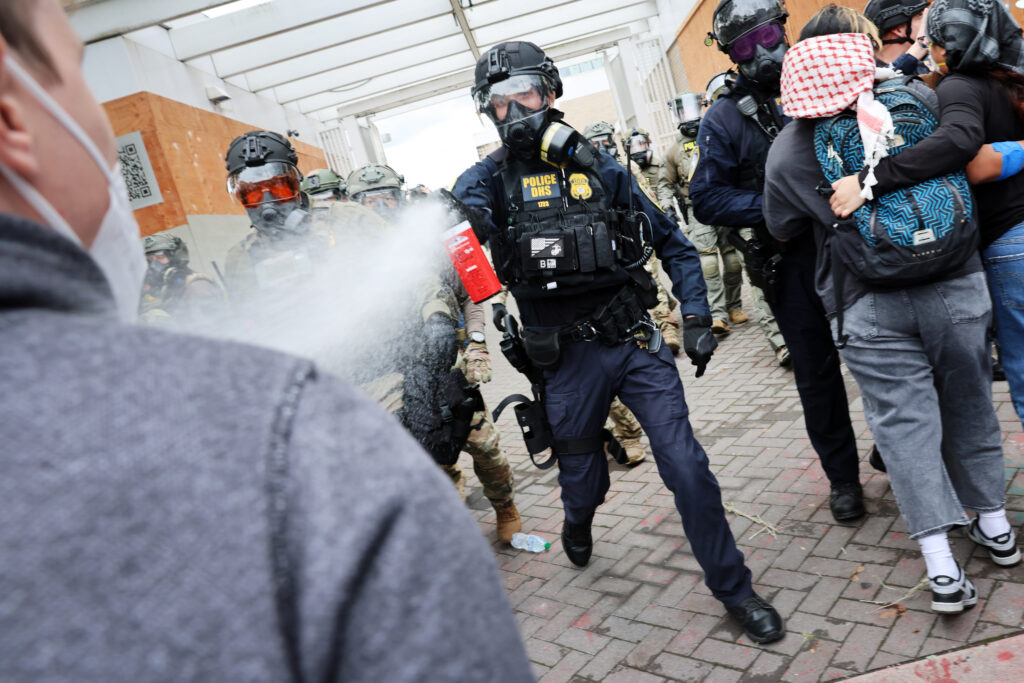‘We Deeply Regret These Errors’: DOJ Walks Back Key Evidence In Defense of Trump’s Portland Deployment

The Department of Justice (DOJ) Monday corrected a key piece of evidence it repeatedly cited in defense of President Donald Trump’s attempted military deployment in Portland, Oregon, last month.
In a letter to the Ninth Circuit Court of Appeals, Andrew Bernie, a DOJ attorney, said the Trump administration made several “errors” in describing how many special law enforcement officers it sent to Portland in response to protests outside of an Immigration and Customs Enforcement facility in the city.
Get updates straight to your inbox — for free
Join over 350,000 readers who rely on our daily and weekly newsletters for the latest in voting, elections and democracy.
The disclosure, which came in Portland and Oregon’s lawsuit against the deployment, marks a rare walkback from the DOJ that may damage its legal defense of Trump’s military intervention in the City of Roses.
Attempting to prove that Trump had the authority to send troops into the city, government officials claimed 115 Federal Protection Service (FPS) officers were ordered to the city between June and September. The number represented nearly a “quarter” of the whole FPS force that protects federal facilities and employees, the government claimed in court filings.
In oral arguments and court filings, the DOJ repeatedly argued that this major reallocation of FPS officers indicated that Trump was unable to enforce federal law in Portland with regular forces and was therefore justified in calling up around 200 Oregon National Guard troops in September.
The number of FPS officials allegedly sent to Portland was a key piece that a Ninth Circuit panel relied on in determining last week that Trump had the authority to federalize and deploy Guard troops to the city.
Oregon and Portland asserted in a letter to the panel last week that the Trump administration greatly misrepresented how many FPS officers it sent. They said evidence obtained in discovery indicated that the number of FPS officers in Portland never surpassed 31 at any time.
In the department’s response letter Monday, Bernie acknowledged that, based on a review by the Department of Homeland Security, the government only sent 86 FPS officials to Portland over the summer.
Bernie added that the DOJ also incorrectly stated that a “quarter” of the entire FPS force was sent to the city.
“We stated in our supplemental brief that ‘it is undisputed that nearly a quarter of the agency’s entire FPS capacity had to be redirected over a relatively short period to a single location in one medium-sized American city due to the unrest there,’” Bernie wrote. “This statement was incorrect.”
Instead, Bernie claimed that the statement was meant to refer to the percentage of FPS “inspectors” who were sent to Portland. Rather than a quarter, the amount was only around 13% of all FPS inspectors, Bernie wrote.
“We deeply regret these errors,” he added.
Bernie said the discrepancies should not influence the panel’s ruling upholding Trump’s deployment because the number of FPS officers in Portland didn’t form the basis of its decision.
However, in the ruling, the panel’s majority repeatedly cited the amount of FPS officers in the city, at one point saying that the president may in part rely on FPS deployments to measure whether he is unable to execute the law with regular forces and needs to mobilize the National Guard.
The panel’s expansive ruling, which alarmed several legal experts, stayed a district court order blocking Trump’s deployment.
The Ninth Circuit stayed the ruling last week to hold a vote on whether a larger panel should take up Trump’s appeal of the district court order.
A district court judge is set to preside over a three-day trial starting Wednesday to consider the merits of Trump’s military intervention in Portland. Following the trial, the judge could block the deployment again.